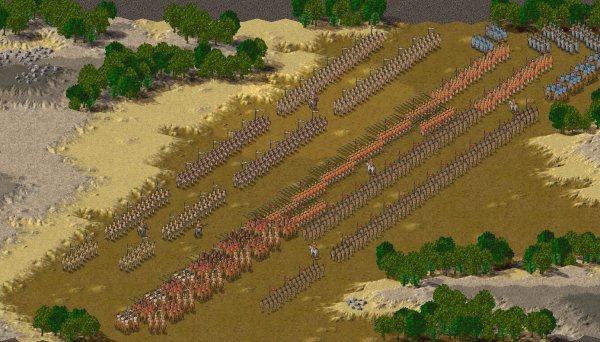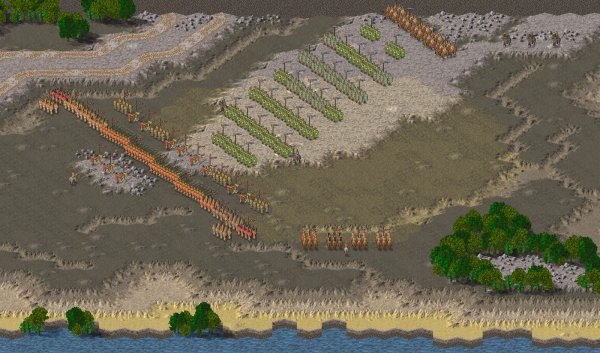Diadochi Funeral Games
Submitted by Nick Welman
Battle of Crannon - Lamian War - 322 B.C.
Battle of Ipsus - The Battle of the Kings - 301 B.C.
Battle of Corupedion - 281 B.C.

The Funeral Quintet - Part 1
The Greek city states seized the opportunity of Alexander's death to rebel against Antipater's regency over Greece. After their first victory over Macedonia, Leonnatus had to come
to Antipater's aid with his army of Hellespontine Phrygians. But Leonnatus was killed in battle. Antipater's second hope was Craterus: he was on his way from Babylon back to Macedonian with 6,000 veterans from Alexander's invincible
forces. At Crannon in the late summer of 322 B.C. this new Macedonian coalition stopped the Greek successes. It was to prove Craterus' last victory.
(Craterus died next year in battle against his former fellow commander Eumenes.
Craterus reputation as a military leader was unsurpassed and he was loved by the Macedonians as no other. Therefore Eumenes had to trick his troops into battle, cunningly telling them they would not battle against Craterus but against some
minor local prince. Your battle of Crannon is a last salute to Craterus.)
Normal rout levels: Macedonian 78 (19%); Greek 86 (34%).
Hard rout levels: Macedonian 58 (14%); Greek 107 (42%).
Your turn limit is 5. Estimated playing time: 30 minutes.
Strategy guide
The battle is designed to be played from the Macedonian side.
The Greeks employed superb cavalry at Crannon, which they trusted so much they put their horse in front of their phalanx. Indeed the Macedonian cavalry was eliminated during the first engagements of the fighting. You will enter the battle of Crannon at this stage.
Size
Macedonian: 43,000 infantry, 5,000 cavalry. Greek: 25,000 infantry, 3,500 cavalry.
The Macedonian army has 68 units with a total of 404 rout points. The Greek army has 48 units with a total of 256 rout points.
Battle of Lisymacheia - Victory over the Gauls - 277 B.C.
Battle of the Elephants - The Elephant Victory - 270 B.C.
In 323 B.C. Alexander the Great proclaimed on his deathbed: "I foresee that a great combat of my friends will be my funeral games." Indeed the Diadochi Wars (Successor Wars) over the spoils of Alexander's
conquests saw some of the largest armies of the Ancient world in action. This 5-piece drama offers you the opportunity to command the fine Macedonian and Seleucidian armies of that era.
For some historical correctness all five
battles are 'joined in progress'. You will enter the games at the very moment your enemy makes its decisive attack - so you are in the middle of the action right from the word 'go'. The scenarios rely heavily on Peter Green (Alexander to
Actium), Sherwin-White & Kurt (Sardis to Samarkhand), Delbrück and Diodorus.
In 322 B.C. - after Alexander's death - the Greeks rose in revolt against Macedonian rule. Alexander's veteran commander Craterus brought in his crack troops to end this so-called 'Lamian War' and to secure the hegemony of Alexander's Successors.
This was the signal for an endless power struggle between the Successors until the final, decisive battle in 301 B.C.: Ipsus, known as the Battle of the Kings. Antigonus the One-Eyed, the former champion of the Successors, was trashed by Seleucus' elephants. The empire was then divided between Seleucus, Cassander, Lisymachus and Ptolemy.
Lisymachus of Thrace soon annexed Cassander's Macedonia. But in 281 B.C. Lisymachus in turn was smashed by Seleucus. Seleucus now entered Europe and balanced on the edge of reuniting Alexander's empire (save Egypt). However, he was assassinated before he could reach his homeland Macedonia.
Around that time fierce Gaulish tribes - the Galatians - began pouring into the civilised world from the north. They ravaged Greece and Macedonia, until their hordes were decimated by Antigonus II Gonatas in 277 B.C. This suprising victory enabled Antigonus to rightfully claim the throne of Macedonia - which had virtually been vacant for years.
The marauding Galatians now migrated to Asia. Antiochus I 'the Savior', the son of Seleucus, managed to stop their long reign of terror with his enigmatic 'Elephant Victory' somewhere around 270 B.C. As the dust settled, the Ancient world of the Diadochi had finally come to rest - for the time being.
Craterus and Antipater join forces to defeat the Greek resistance against the successors of Alexander the Great.

The Funeral Quintet - Part 2
In 301 B.C. four Successor kings allied against King Antigonus the One-Eyed and his son Demetrius the Besieger. The allies were Ptolemy of Egypt, Cassander of Macedonia, Lisymachus
of Thrace and Seleucus of Asia. Cassander had sent some troops to aid Lisymachus in his campaign against Antigonus, but the final battle that turned the tides happened when Seleucus joined the allied forces with 480 Indian elephants which
he had acquired after his abortive campaign against the Indian king Chandragupta.
Antigonus and Demetrius held all the trumps, but Demetrius was overconfident. As he pursued the beaten allied left wing cavalry, he lost contact with
the body of troops commanded by his father. Seleucus now used his mass of elephants with devastating effect, denying Demetrius to return to the line of battle. Antigonus died and Demetrius escaped. With close to 200,000 combatants in the
field Ipsus is easily the greatest battle of the Diadochi era.
Normal rout levels: Seleucid 78 (11%); Macedonian 216 (29%).
Hard rout levels: Seleucid 58 (8%); Macedonian 270 (37%).
Your turn limit is 6. Estimated playing time: 90 minutes.
Strategy guide
You will join the battle as Demetrius is in pursuit of your retreating left wing.
The battle is designed to be played from the Seleucid side.
Size
Seleucid: 64,000 infantry, 15,000 cavalry, 480 elephants, 100 chariots. Macedonian (Antigonus): 70,000 infantry, 10,000 cavalry.
The Seleucid army has 166 units with a total of 708 rout points. The Macedonian army has 118 units with a total of 739 rout points.
The Seleucid elephant corps destroys Antigonus the One-Eyed.

The Funeral Quintet - Part 3
Very little is known about this decisive battle. King Lisymachus - ruler of Thrace after Alexander's death - had risen in power, ruling over Macedonia and threatening Seleucus'
possessions in Asia Minor. Lisymachus was killed in battle at Corupedion in 281 B.C. A strange role was played by Ptolemy Thunderbolt, an Egyptian prince who had received asylum with Lisymachus. Thunderbolt changed sides after the battle
and became an ally of Seleucus. But as warlord Seleucus the Conqueror - who was probably aged 77 by now - advanced to reclaim Macedonia, Thunderbolt assassinated him.
Ptolemy Thunderbolt became king of Macedonia, but he did not
last. He was soon murdered by the invading hordes of Gauls and the Macedonian throne became vacant. Another star at Corupedion is Philetaros, the general from Pergamon whose military successes paved the way for an independent kingdom in
western Asia.
Normal rout levels: Seleucid 131 (31%); Macedonian 177 (33%).
Hard rout levels: Seleucid 98 (24%); Macedonian 221 (41%).
Your turn limit is 5. Estimated playing time: 45 minutes.
Strategy guide
You will join the battle as the phalanxes clash.
The battle is designed to be played from the Seleucid side.
Size
Seleucid: 31,500 infantry, 9,500 cavalry, 60 elephants and 15 chariots. Macedonian: 51,000 infantry, 8,300 cavalry and 25 elephants.
The Seleucid army has 76 units with a total of 416 rout points. The Macedonian army has 88 units with a total of 536 rout points.
Seleucus defeats Lisymachus for control over Asia.

The Funeral Quintet - Part 4
Antigonus II Gonatas was the son of Demetrius the Besieger, grandson of Antigonus I the One-Eyed. He was the least likely of conquerors. Gonatas was a Stoic philosospher in arms,
short, snub-nosed and knock-kneed. As his dynasty had lost everything at Ipsus, he was a king without kingdom. Yet, with a hired army of mercenaries, he was the one who managed to slaughter a column of 18,000 Gauls at Lisymacheia. This
victory earned him the throne of Macedonia. So at last the Antigonid dynasty found its homeground, until the last Antgonid Macedonian king Perseus was destroyed by the Romans in 168 B.C.
It is written that Gonatas somehow managed to
encircle the Galatians (Gauls) at Lisymacheia, leading towards a very bloody victory. Lysimacheia ended the terrifying Gallic raids in Europe. What is most remarkable about this episode of history is that Alexander's Successors - with all
their fine knowledge of the art of war - had not been able to withstand the brutal forces of nature represented by those undisciplined barbarian hordes. Until Gonatas came along.
Normal rout levels: Macedonian 28 (21%);
Gallic 103 (38%).
Hard rout levels: Macedonian 21 (16%); Gallic 123 (46%).
Your turn limit is 6. Estimated playing time: 30 minutes.
Strategy guide
You will join the battle during the attack of the first wave of Gauls.
The battle is designed to be played from the Macedonian side.
Size
Macedonian: 14,500 infantry, 1,800 cavalry. Gallic: 18,000 infantry, 2,000 cavalry.
The Macedonian army has 31 units with a total of 131 rout points. The Gallic army has 35 units with a total of 270 rout points.
Antigonus II Gonatas defeats the Gauls and claims the throne of Macedonia.

The Funeral Quintet - Part 5
Being driven out of Europe, the Galatians marauded in Asia Minor. Around 273 B.C. Antiochus, the son of Seleucus, faced the invaders with a ramshakle army of light infantry and
some sixteen Bactrian war elephants. The Gauls were not used to the sight of elephants. Although the regular Seleucid forces lacked the power to beat the ferocious Gauls, those courageous pachyderms saved the day and forced the Celtic
warriors to rout. This Elephant Victory earned King Antiochus the title "Soter" - the Savior.
In retrospect Antiochus appeared quite embarrassed that the future of his entire empire - and the safety so many - had depended
on the efforts of so few. He is recorded to have said: "I am ashamed that we are indebted for our salvation to these sixteen animals." There is some controversy about the proper date of the Elephant Victory. I have followed Peter
Green's estimate of 270 B.C.
Normal rout levels: Seleucid 57 (28%); Gallic 122 (39%).
Hard rout levels: Seleucid 42 (21%); Gallic 152 (49%).
Your turn limit is 3. Estimated playing time: 15 minutes.
Strategy guide
You will join the battle as the Celts are on the fringe of destroying your central line of defense. You better bring forward those elephants as soon as possible.
The battle is designed to be played from the Macedonian side.
Size
Seleucid: 21,000 infantry, 2,500 cavalry, 15 elephants. Gallic: 15,000 infantry, 10,000 cavalry.
The Seleucid army has 47 units with a total of 204 rout points. The Gallic army has 50 units with a total of 312 rout points.
Antiochus I Soter (the Savior) uses his war elephants to destroy the Gauls.
Shortcuts to the Battles
Read the comments on this scenario
